初中英语第二册unit2
人教版初中八年级英语下册第二单元Unit 2 教案含教学反思
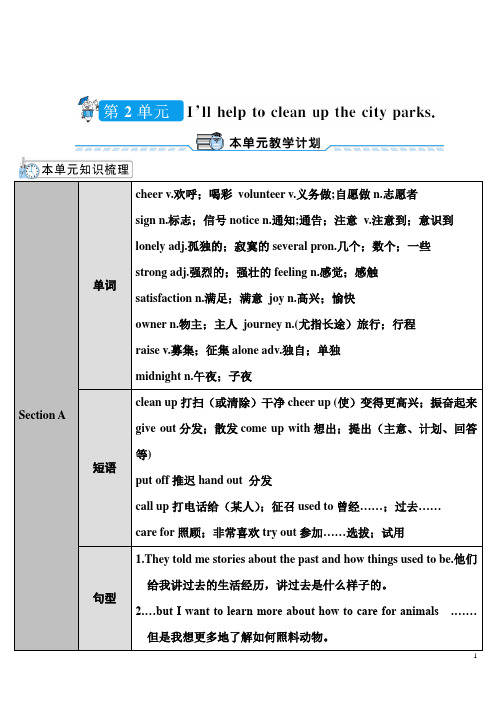
Section A 单词cheer v.欢呼;喝彩volunteer v.义务做;自愿做n.志愿者sign n.标志;信号notice n.通知;通告;注意v.注意到;意识到lonely adj.孤独的;寂寞的several pron.几个;数个;一些strong adj.强烈的;强壮的feeling n.感觉;感触satisfaction n.满足;满意joy n.髙兴;愉快owner n.物主;主人journey n.(尤指长途)旅行;行程raise v.募集;征集alone adv.独自;单独midnight n.午夜;子夜短语clean up打扫(或清除)干净cheer up (使)变得更高兴;振奋起来give out分发;散发come up with想出;提出(主意、计划、回答等)put off推迟hand out 分发call up打电话给(某人);征召used to曾经……;过去……care for照顾;非常喜欢try out参加……选拔;试用句型1.They told me stories about the past and how things used to be.他们给我讲过去的生活经历,讲过去是什么样子的。
2.…but I want to learn more about how to care for animals.……但是我想更多地了解如何照料动物。
句型1.I’m sure you know that this group was set up to help disabled people like me.我确定你知道这个团体是为了帮助像我这样的残疾人而建立的。
2.You helped to make it possible for me to have Lucky.有了你的帮助,我才有可能拥有“幸运儿”。
3.I’ll send you a photo of him if you like,and I could show you how he helps me.如果你喜欢,我会把它的一张照片寄给你,并可以让你看看它是怎样帮助我的。
初中英语:Unit2 Daily life(课件)
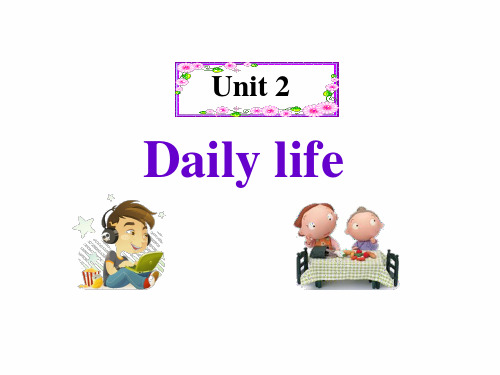
My chat room Sam: Is your school close to your home,
Mandy? Mandy: Yes, it is, so I go to school __o_n__fo_o_t_. Sam: Do you have a lunch __b_r_ea_k___?
A day at my school (at noon)
Our morning classes…at 11:50 a.m.From 11:50 to 12:30,our headmaster and teachers... with us.We enjoy… play table tennis,play piano.
4. Afternoon classes end at 3.30 p.m.
a stop
b begin
5. We make great music together.
a with each other b every day
p18 C2
Complete the conversation between Sam and Mandy.
['nevə] ['ɑːtɪk(ə)l] ['deɪlɪ]
1.Every day,I r_i_d_e_____ a bike to school. (得分率 97%,错误1人)
2.I get up at 7:00 am,so I am s_el_d_o_m___late for school.
(得分率82%,错误1人)
A day at my school (in the morning)
人教版(新目标)初中英语七年级下册Unit 2预习自学

Unit 2单词(音标)up [ ʌp] adv. 向上get up 起床;站起dress [ dres] v. 穿衣服 n. 连衣裙getdressed 穿上衣服brush [ brʌʃ] v. 刷刷净 n. 刷子tooth [ tuːθ] n. ( pl. teeth[ tiːθ]) 牙齿shower [ ' ʃaʊə]n.& v.淋浴n. 淋浴器(间)take a shower 洗淋浴usually [ ' ju: ʒuəli] adv. 通常地;一般地forty [ ' fɔ:( r) ti] num. 四十wow [ waʊ] interj.(表示惊奇或敬佩)哇;呀never [ ' nevə( r)] adv. 从不;绝不early [ ' ɜːlɪ]adv.& adj. 早(的)f i fty [ ' f ɪ ftɪ]num. 五十job [ dʒɒb], [ dʒɑːb] n. 工作;职业work [ wɜːk] v. & n. 工作station [ ' steɪʃn] n. 电( 视) 台;车站radio station 广播电台o' clock [ ə' klɒk], [ ə' klɑ: k] adv.(表示整点)…… 点钟night [ naɪt] n. 晚上;夜晚funny [ ' fʌnɪ] adj. 奇怪的;滑稽好笑的exercise [ ' eksəsaɪz]v.& n. 锻炼;练习on weekends ( 在) 周末best [ best] adj. 最好的 adv. 最好地;最group [ gruːp] n. 组;群half [ hɑːf], [ hæf] n. & pron. 一半;半数past [ pɑːst],[ pæst]prep. 晚于;过(时间) adj. 过去的quarter [ ' kwɔː( r) tə( r)]n. 一刻钟;四分之一homework[' həʊmwɜː( r) k] n. 家庭作业do( one’ s) homework 做作业run [ rʌn] v. 跑;奔clean [ kliːn]v. 打扫;弄干净 adj. 干净的walk [ wɔːk]n.& v. 行走;步行take a walk 散步;走一走quickly [ ' kwɪkli] adv. 很快地either [ ' aɪðə( r)], [ ' iː ðə( r) ] adv. 或者;也(用在否定词组后)either… or…要么……要么……;或者……或者……lot [ lɒt], [ lɑ: t] pron. 大量;许多lots of 大量;许多sometimes [ ' sʌmtaɪmz] adv. 有时taste [ teɪst]v. 有……的味道;品尝 n. 味道;滋味li fe [ laɪf]n. 生活;生命Rick [ rɪk] 里克(男名)Jim [ dʒɪm] 吉姆(男名)Scott [ skɒt], [ skɑ: t] 斯科特(男名)Tony [ ' təʊnɪ] 托尼(男名)unit2电子课本Liaten and match the timea with the actions. Draw lines from the clocksto the pictures.Snident A ie the interviewer. Student B is Rick. Ask amd axxswerquestions about Rick's day.A: V 'ha c t tim dci yo u usually take a s lioive r, Rick * B : 1 us my take a sh never aI s ix fo rty.Match theactivi£ics wiEts tJze pictures.1. ,lot up c?. gn tn sChnnlri t si x i hi r r yWhos tiry›c dg ypuusmlly get up7Jim hassisters. Jim’s familyhas _ xhuxvcr.Ltccers agaJxs. Cossp!ete tbe shower schedcsle £orJiza*c fiuoJ3y'.Tims5:3¢linterviewer: -$cott has an inrcrext ing jrib. He wcirks at a radiri station.Scott, what time is your radio show?Ston: Interviewer: Scott:From bvelve o’clock at night to six oklock in the morning. What time do you usually get up?At eight thirty at night. ”thenI eat breakfast at nine.Interviewer: ‘Heat s a ftnftf¥y titTte fOr t›renkfast!S‹ort:Scoti:Yeah. After that, I usually exercise at a1›nut ten twenty. then do you go to «'ork?At 4•levcn t3’clock, .*cl I 'mnever late for work.tøte on •<cłændsüh< țjr î3 uc u14.Anna never eats breakfast.S. What rime does your be3t Friend go to sckooł7When do students usually do these things? h4atchthe activitie.s tenth the time of day..i .jiiartcr i‹› ten ii* ila.Check your answers with your partner.sListen rind circle the activities yuu hear.g= =p 5: 30.1. eat \ realm:1st 4. ¿u tu choul. in hnmc7. clcan i riy rel t3It1G. eat ‹4in n er9. t.Ake a is' all 1 O. t;ci ter b c dListen agatn. Wrtte Mtc titres text to tbe actioicies yotz circled In 1 c.AkandanswerquesConsaboutlom. ’Unit2 知识梳理◆短语归纳1.what time 几点2.go to school 去上学3.get up 起床4.take a shower 洗淋浴5.brush teeth 刷牙6.get to 到达7.do homework 做家庭作业8.go to work 去上班9.go home 回家10.eat breakfast 吃早饭11.get dressed 穿上衣服12.get home 到家13.either…or…要么…要么…14.go to bed 上床睡觉15.in the morning/afternoon/evening 在上午/下午/晚上16.take a walk 散步17.lots of=a lot of 许多,大量18.radio station 广播电台19.at night 在晚上20.be late for=arrive late for 迟到◆用法集萃1.at + 具体时间点在几点(几分)2.eat breakfast/lunch/dinner 吃早饭/午饭/晚饭3.thirty/half past +基数词…点半4.fifteen/a quarter to +基数词差一刻到…点5.take a/an+名词从事…活动6.from…to…从…到…7.need to do sth 需要做某事◆典句必背1.—What time do you usually get up? 你通常几点钟起床?—I usually get up at six thirty. 我通常6:30起床。
初中英语七年级下册 Unit2 what time do you go to school

always
usually
often
sometimes
never
频度副词的位置
频度副词通常位于实义动词之前,be动词之后:
Tom is always late for school.
Mary doesn’t often help her friends.
___________________________________
4) _______________________________?
Anna never eats breakfast.
5) What time does your best friend go to school?
_________________________________
Jenny: I usually get up at 7:00.
You: What time do you exercise?
Jenny: I usually exercise at eight.
You: What time do you usually eat dinner?
Jenny: I usually eat dinner at 6:30.
人教版英语科目第二单元第二课时教学设计
Unit 2 What time do you go to school?
Section A (Grammar Focus-3c)
课题
Unit 2 What time do you go to school?
单元
第二单元
学科
英语
年级
七年级下册
外研版英语九年级下册Module2 Unit2 精品教案
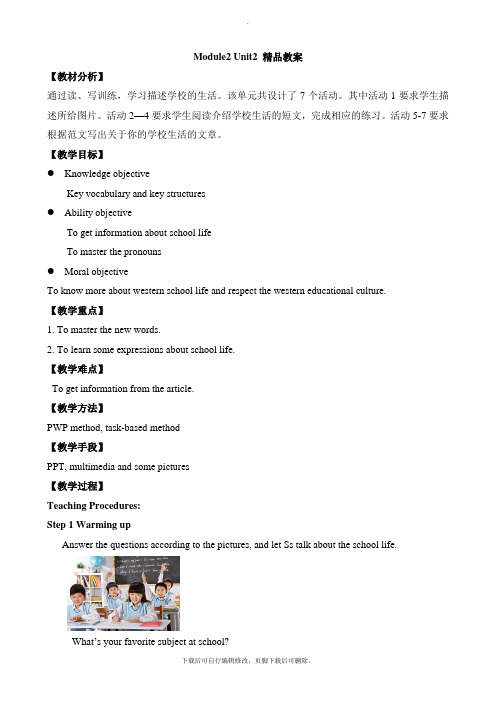
Module2 Unit2 精品教案【教材分析】通过读、写训练,学习描述学校的生活。
该单元共设计了7个活动。
其中活动1要求学生描述所给图片。
活动2—4要求学生阅读介绍学校生活的短文,完成相应的练习。
活动5-7要求根据范文写出关于你的学校生活的文章。
【教学目标】●Knowledge objectiveKey vocabulary and key structures●Ability objectiveTo get information about school lifeTo master the pronouns●Moral objectiveTo know more about western school life and respect the western educational culture.【教学重点】1. To master the new words.2. To learn some expressions about school life.【教学难点】To get information from the article.【教学方法】PWP method, task-based method【教学手段】PPT, multimedia and some pictures【教学过程】Teaching Procedures:Step 1 Warming upAnswer the questions according to the pictures, and let Ss talk about the school life.What’s your favorite subject at school?Do you like PE?Do you like playing football?Do you like playing tennis?Have you ever taken part in the after-school activities?Step 2 New wordsLook and say. The teacher shows the new words or expressions, and let the students to say as quickly as possible.pass v. 及格; 通过(考试或检查)secondary adj. (教育)中等的; 次要的; 间接的secondary school 中学absent adj. 缺席的; 不在的bell n. 钟;铃Step 3 Look and sayLet Ss look at the photos and say what they can see.Step 4 Reading1. Let Ss read the passage and answer the questions.1) How long has Susie been at River School?2) How long does her schoolday last?3) Do all the students at River School have the same subjects?4) How do you like Susie’s school life? Why?2. Let Ss read the passage again and put the statements into the correct group.1) Susie has been at school since she was five and she will be at school until she is eighteen.2) All schools in the UK are like River School.3) Lessons start at 9:05 am.4) The fourth lesson starts at 1:15 pm.5) There is a parents’ meeting each term.We can get the information from the passage directly: ___________We can get the information from the passage indirectly: ___________We cannot get the information from the passage: __Step 7 Language points1. If I pass my exams next year, I’ll stay here until I’m eighteen.pass表示“通过〔检查或考试〕〞。
初中英语外研英语Module_2_unit_2_These_are_my_parents
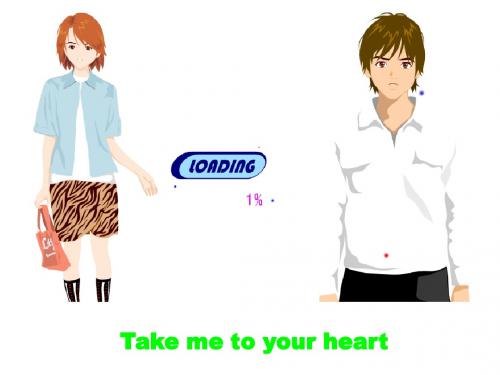
hospital
hotel
doctor
university manager
Teacher professor
school
office factory secretary teacher manager
worker
Work in pairs.
What are your parents’ jobs ? e.g. My mother is a(n)…. She works in …. My father is a(n)…. He works in …. ……
8) 指示代词this与 these的用法 these是 this的复数, 都是用来指身 边或距离较近的人或事物。this 作主 语时,后面的be动词用is, 后面跟
的名词用单数形式。these作主语时,
后面的be动词用are,后面跟的名词
用复数形式。
回答主语是this与 these的一般疑问句 时, 用it 与they。打电话介绍自己时, 用 “This is …” 或“It is …” “我是……”, 不能用 “I am …” 。 e.g. (1) This is my photo .这是我的照 片。 (2) These are my photos. 这些是我 的照片。
Complete the table
Betty Father teacher Mother secretary Daming
factory manager
doctor
Look at this sentence. Then write sentences with full stops and capital letters. capital letters 大写 full stop句号 My name is Tony and I’m English. 1. these american teachers can speak chinese These American teachers can speak Chinese.
沪教牛津版七年级英语UNIT2Dailylife
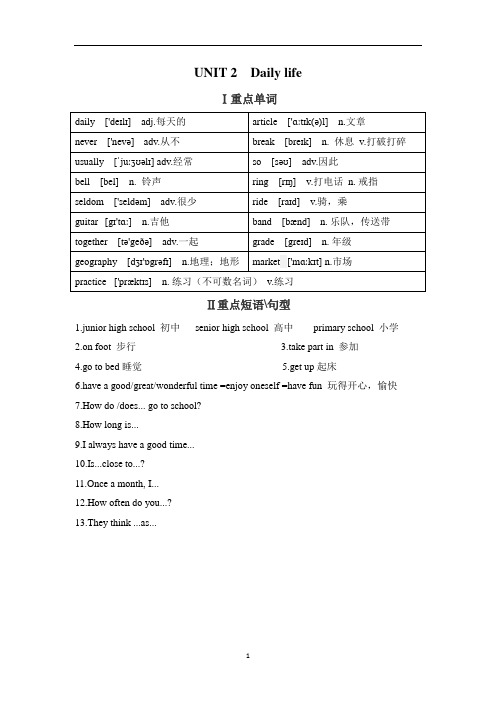
UNIT 2 Daily life1.junior high school 初中senior high school 高中primary school 小学2.on foot 步行3.take part in 参加4.go to bed睡觉5.get up起床6.have a good/great/wonderful time =enjoy oneself =have fun 玩得开心,愉快7.How do /does... go to school?8.How long is...9.I always have a good time...10.Is...close to...?11.Once a month, I...12.How often do you...?13.They think ...as...III详细讲解1. once or twice a week每周一两次注意:在英语中,表示一次用“once”,两次用“twice”,表示三次或者三次以上就用“基数词+times”(time在这里是可数名词,表示次数,需要加“s”)如:once a week,twice a week, three(four/ five…)times a week2. brush one’s teeth刷牙brush ①在这里是动词,表示“刷”②n.可数名词,“刷子”复数形式是“ brushes”。
如:I need some brushes for painting. tooth的复数形式是“ teeth”牙齿(因为每个人刷牙的时候不止刷一颗牙齿,所以要用复数)3.watch television= watch TV 看电视4.ride a bicycle 骑自行车动词短语,交通工具前要加限定词(如a ,the)同义词:by bicycle/bike 介词短语,交通工具前不用加限定词5.be close to 离……近= near =beside= not far away from(上节课学过)6.so在此处用作连词,表示结果“因此;所以”的意思。
八年级英语外研版下册Module2Unit2教材知识详解
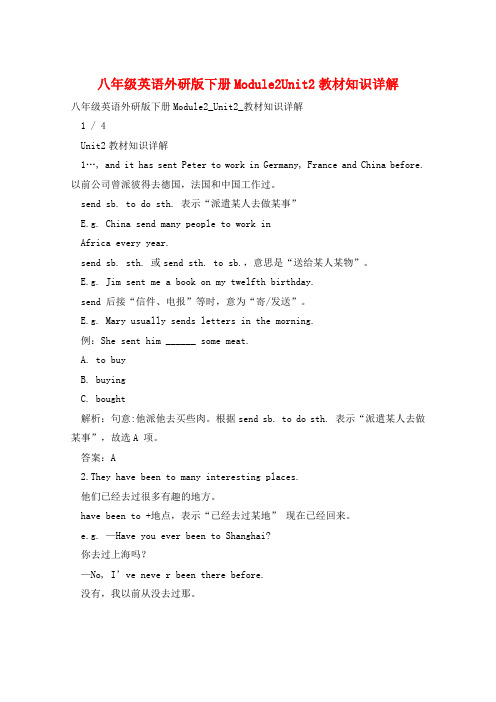
八年级英语外研版下册Module2Unit2教材知识详解八年级英语外研版下册Module2_Unit2_教材知识详解1 / 4Unit2教材知识详解1…, and it has sent Peter to work in Germany, France and China before. 以前公司曾派彼得去德国,法国和中国工作过。
send sb. to do sth. 表示“派遣某人去做某事”E.g. China send many people to work inAfrica every year.send sb. sth. 或send sth. to sb.,意思是“送给某人某物”。
E.g. Jim sent me a book on my twelfth birthday.send 后接“信件、电报”等时,意为“寄/发送”。
E.g. Mary usually sends letters in the morning.例:She sent him ______ some meat.A. to buyB. buyingC. bought解析:句意:他派他去买些肉。
根据send sb. to do sth. 表示“派遣某人去做某事”,故选A 项。
答案:A2.They have been to many interesting places.他们已经去过很多有趣的地方。
have been to +地点,表示“已经去过某地” 现在已经回来。
e.g. —Have you ever been to Shanghai?你去过上海吗?—No, I’ve neve r been there before.没有,我以前从没去过那。
have gone to +地点,表示“已经去了某地”现在还没有回来,此时可能在途中或已经到了目的地。
E.g. My teacher has gone to the library.我的老师去图书馆了例:Mr. White ______________ Dalian twice. It’s a beautiful place.A. has been toB. has gone to C went to解析:句意:他曾去过两次大连,那是个很美丽的地方。
人教版八年级下册英语第二单元unit2知识点梳理说课讲解

Unit 2 What should I do?一丶重点短语1.argue v.争论;争吵argue with sb.与某人吵架 I my best friend.我和我的好朋友吵架了。
2.① either adv.(用于否定句)也He doesn’t have any money, and I don’t,.他没有钱,我也没有。
I can’t play chess. She can’t,.我不会下国际象棋,她也不会。
② too 也(用于肯定或疑问句) I’m a teacher.He is a teacher,.我是老师,他也是老师。
3.ask (sb.)for sth.向某人寻求某物;要……Don't food every day.Go and find some work.别天天要饭,找点儿工作做。
I don’t think you should your parents some money.我想你不应向父母要钱。
4.the same as... 与……相同(注意前后两个比较对象的属性保持一致)The clothesmy friends'.这些衣服与我朋友的一样。
Tom is age Anna.= Tom is old Anna.汤姆和安娜一样大。
Her backpack is mine. 她的背包与我的一样。
5.except 除……以外;(不包括……在内)My class has been invited me.除我以外,我的同学都被邀请了。
All the students went to the park him.除了他之外,全体同学都去过公园了。
They all America her. 除了她以外,所有的学生都去美国旅行过。
注意区别:besides 除……以外,还有...(包括在内)We all went there him.除他去以外,我们也都去了。
(= He went there.We went there, too.) 他也去了,我们也去了!/大家都去了!There are five more visitors me.除了我之外还有5名访客(加上我是6个)6.wrong adj.错误的;有毛病的;不合适的─ What's wrong with you? 你怎么了?(你哪里不舒服?) ─ I've got a headache.我头痛。
初中英语Unit_2_This_is_my_sister.教案
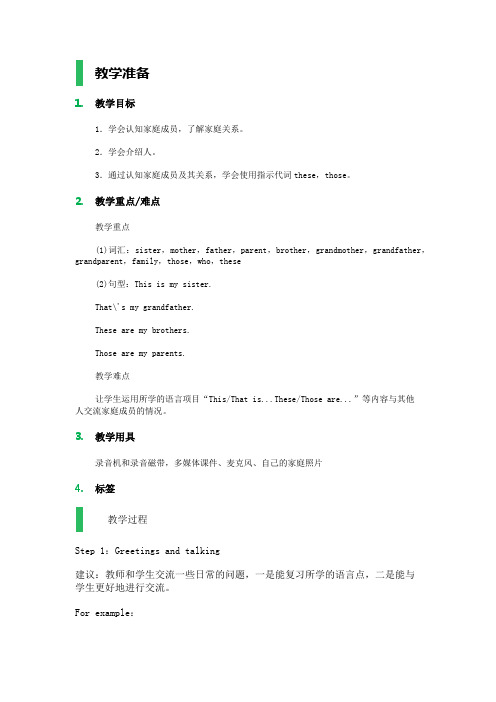
教学准备1. 教学目标1.学会认知家庭成员,了解家庭关系。
2.学会介绍人。
3.通过认知家庭成员及其关系,学会使用指示代词these,those。
2. 教学重点/难点教学重点(1)词汇:sister,mother,father,parent,brother,grandmother,grandfather,grandparent,family,those,who,these(2)句型:This is my sister.That\'s my grandfather.These are my brothers.Those are my parents.教学难点让学生运用所学的语言项目“This/That is...These/Those are...”等内容与其他人交流家庭成员的情况。
3. 教学用具录音机和录音磁带,多媒体课件、麦克风、自己的家庭照片4. 标签教学过程Step 1:Greetings and talking建议:教师和学生交流一些日常的问题,一是能复习所学的语言点,二是能与学生更好地进行交流。
For example:T:What's your name?What's your telephone number?Ss:My name is...My telephone number is...[Step 2:Leadin/Present the new words建议1:教师呈现一幅自己的全家福的照片,然后介绍自己的家庭成员,从而引出本课的新单词。
For example:T:Hello,everyone!Look!What's this?Ss:It's a picture.T:Right.Who is the man in the picture?Ss:It's you.T:Yes,it's me.You know me.Please look at this.Do you know them?Ss:No,we don't.T:They are my family members.Today I want to introduce my family members to you.Would you like to meet them?Ss:Yes.T:OK.Please look at this man?Is he old?Ss:Yes.T:He is my grandfather.Please read after me,GRANDFATHER,GRANDFATH-ER,grandfather.Ss:GRANDFATHER,grandfather.T:This is my grandfather.(Teach the word “grandmother” in the same way.)T:He is my “grandfather”.She is my “grandmother”.These are my grandparents.Read after me,grandparents.Ss:Grandparents.T:I have two brothers,two sisters.I have many friends.(Teach the words “brother” and “sister”.)T:Read these new words together after me.Ss:...建议2:利用多媒体呈现情景剧《家有儿女》中人物的照片,从而导入本课的语言知识。
沪教版初中英语八年级下册Unit 2知识点梳理

沪教版初中英语八年级下册Unit 2知识点梳理Unit 2 Body language【词汇精讲】1. acceptaccept是动词,意为“接受,收受”。
例如:She accepted his flowers happily. 她高兴地接受了他的花。
【拓展】receive和accept的辨析:(1)receive和accept都有“接收”的意思。
receive表示客观上收到,而accept表示主观上接受。
I received his invitation but did not accept it. 我收到了他的请帖,但并没有接受他的邀请。
(2)receive通常指被动地“收到”或“接到”,而accept则指主动地“接受”。
We haven't received his letter for a long time. 我们很久没有收到他的来信了。
She offered him a lift and he accepted (it). 她请他坐她的车,他接受了。
(3)表示“接见、接待”时,要用receive而不用accept。
She was warmly received.她受到热情接待。
2. messagemessage 意为“消息,信息”。
take a message 意为“捎个口信”;leave a message 意为“留个口信”;send a message 意为“发送信息”。
例如:Can I take a message for him? 我能给他捎个口信吗?He sent a message to me yesterday. 他昨天给我发了一条信息。
【拓展】辨析information, news与messageinformation 表示通过打听、观察及学习获得的资料。
news是不可数名词,意为“消息,新闻”,指通过广播、电视及报纸报道的事。
message是可数名词,意为“口信,消息”,指通过口头或笔头传递给他人的消息。
新外研版初中英语七年级下册精品课件Unit 2 I can run really fast

you are kind and friendly to them.
A. sweep away
B. talk
about
C【. g】et短on语w辨el析l w法ith。sweep away“清除”;talk about “谈D. 论tu”rn;onget on well with“与……相处融洽”;turn on“打 开”。根据下文中的kind和friendly可知和同学们能够 “相处融洽”,故选C。
二、根据汉语意思完成句子,并背记英语句子 6. 我与同班同学和老师们相处融洽。 I ______g_e_t______o_n_ _____w__el_l _____w_i_th_ classmates and teachers.
7. 我学习很努力, 在学校做得很好。 I work very hard, and I ______d_o_ _____w__e_llat school.
【 】make sb. do sth.意为“使某人做某事”;stop doing sth. 意为“停止做某事”,指停止正在进行的 事情。前句提到了“这个孩子在哭”可推知后句应表 示“做某事让他不要哭了”。故选B。
5. My birthday is coming. My parents promise ____C____ a new watch for me.
13. As your good friend, I promise to help you.
【 】考查promise的用法。promise to do sth.意为 “承诺做某事”。
14. Every day I run to school and it can keep me fit
.
【 】keep me fit意为“使我保持健康”。
外研版九年级英语下册Module2 Unit2课件

What is life like in a British school? How much do you know about it?
Clothes
wear a jacket and tie
wear school uniform
Classes
sit around the table
afterschool activities
1
They are doing an experiment in the lab.
They are playing football.
They are visiting a museum.
What does Susie discuss regarding her school life?
Fast reading
1. How many students are there in Grade 9? About 300 students. 2. How many classes are there in a day? 9. 3. Which floor is our classroom on? On the four floor . 4. When do we have the first lesson? At 8 a.m. 5. When do we finish the last lesson? Around 5:10 p.m. 6. What do you like most about the school?
Period 2
1.pass the exam 通过考试
fail the exam 考试不及格
2.secondary school 中学
primary school 小学
沪教牛津版初中英语九年级下册Unit 2知识点梳理

沪教牛津版初中英语九年级下册Unit 2知识点梳理Unit2单词culture shock ['kʌltʃə] [ʃɒk] 文化冲击;文化休克camp [kæmp] 度假营*firework ['faɪəwɜːk] 烟火;烟花*turkey ['tɜːkɪ] 火鸡international [ɪntə'næʃ(ə)n(ə)l] 国际的admit [əd'mɪt] (常指勉强)承认spare [speə] 空闲的;空余的degree [dɪ'griː] 程度fail [feɪl] 失败;未能(做到)manage ['mænɪdʒ] 完成(困难的事);勉力完成人生在勤,不索何获idiom ['ɪdɪəm] 习语;惯用语everyday ['evrɪdeɪ; -'deɪ] 每天的;日常的uniform ['juːnɪfɔːm] 校服whatever [wɒt'evə] 任何事物;一切事物pink [pɪŋk] 粉红色的purple ['pɜːp(ə)l] 紫色的anyway ['enɪweɪ] 无论如何;反正especially [ɪ'speʃ(ə)lɪ; e-] 尤其;特别baseball ['beɪsbɔːl] 棒球运动education [edjʊ'keɪʃ(ə)n] 有教益的经历state [steɪt] 州,国家national ['næʃ(ə)n(ə)l] 国家的;民族的;全国的president ['prezɪd(ə)nt] 总统vacation [vəˈkeɪʃn; veɪ-] 假期schedule [ˈʃɛdjuːl] 日程安排set off 使(炸弹等)爆炸take off 脱下in one's spare time 在某人的空闲时间里to a certain degree 在某种程度上get used to 习惯于;适应under the weather 略有不适;不得劲Unit2课文Culture shock文化冲击Brad Li is a junior high school student in China. He visited the US on an international exchange last year, and now he is giving a speech about his experience.布兰德·李是中国一所初中的学生。
初中九年级英语Unit 2Unit2 SectionA(Grammar Focus—4c)
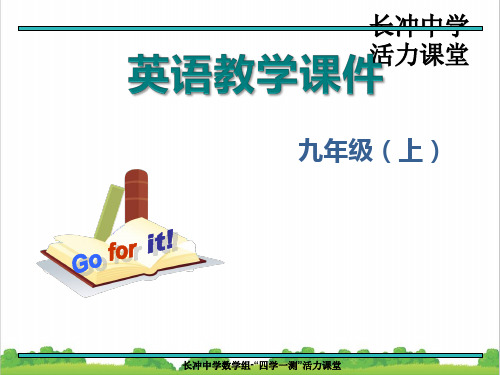
主谓
长冲中学 宾语 从句 活力课堂
I know that the Water Festival is really fun.
Mary thinks that the teams were fantastic.
I wonder if they will have the races again next year. I wonder whether June is a good time to visit Hong Kong.
宾语从句放在句首表 Whether it is true or
示强调时
not, I can’t tell.
长冲中学数学组-“四学一测”活力课堂
长冲中学 宾语从句的时态取决于主句的时态 活力课堂
主句使用现在时,从句可使用任何时态;主句 使用一般过去时,从句除表示“真理”可使用 现在时态外,一律使用过去时态。
where, why, how等。
长冲中学数学组-“四学一测”活力课堂
从句原形
关联词
长冲中学 活例句力课堂
陈述句
t正ha式t(文在体口中语常或省非略)IHtahlilnowk e(ethnaits)a fun festival.
一般疑问句
whether, if (在口语中常用if)
I wonder if/ whether they will have the races again next year.
长冲中学数学组-“四学一测”活力课堂
2 how引导的感叹句
长冲中学 活力课堂
How+ adj.+ a/an+ n.+主+谓+…! How+(adj./adv.)+主+谓+…!
初中英语 七年级下册 Unit2 what time do you go to school

✓ 询问事情发生的年份、月份、日期以及上 午、下午或晚上等非钟点性时间时,只能 用when。如: — When did the story happen? — On the morning of March 18, 2015.
频度副词
频度副词表示“多久一次”,是一种表 示频繁程度的副词。常见频度副词按频率大 小排列如下:
4. _W__h_a_t_t_im__e_d_o_e_s_A__n_n_a_u__su_a_l_l_y_e_a_t_b_r_e_a_k_f_a_s_t ____? Anna never eats breakfast.
5. What time does your best friend go to school? _S_h_e_u_s_u_a_l_ly__g_o_e_s_t_o_s_c_h_o_o_l_a_t_s_i_x_f_o_r_ty_._________
activities with proper tdim. pelaoyf tfhooetbdaalyl.
e. have lunch
f. go to school
10:00 p.m.
5:3nswer questions about Jack’s day.
Functions: Talk about daily routines.
Grammar: What time and When questions Adverbs of frequency
New words and phrases
on weekends best group
(在)周末 adj.最好的 adv.最好地;最 n.组;群
They usually exercise on
w频eek度en副ds词. 用来表示做 某事的频率。它们和 动词的位置有何关系?
人教版(新目标)初中英语七年级下册Unit 2
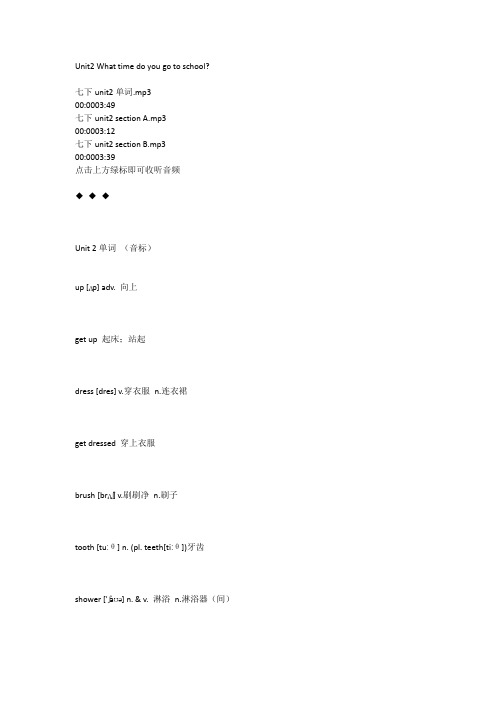
Unit2 What time do you go to school?七下unit2单词.mp300:0003:49七下unit2 section A.mp300:0003:12七下unit2 section B.mp300:0003:39点击上方绿标即可收听音频◆◆◆Unit 2单词(音标)up [ʌp] adv. 向上get up 起床;站起dress [dres] v.穿衣服n.连衣裙get dressed 穿上衣服brush [brʌʃ] v.刷刷净n.刷子tooth [tuːθ] n. (pl. teeth[tiːθ])牙齿shower ['ʃaʊə] n. & v. 淋浴n.淋浴器(间)take a shower 洗淋浴usually ['ju:ʒuəli] adv.通常地;一般地forty ['fɔ:(r)ti] num.四十wow [waʊ] interj.(表示惊奇或敬佩)哇;呀never ['nevə(r)] adv.从不;绝不early ['ɜːlɪ] adv. & adj.早(的)fifty ['fɪftɪ] num.五十job [dʒɒb], [dʒɑːb] n.工作;职业work [wɜːk] v. & n. 工作station ['steɪʃn] n.电(视)台;车站radio station 广播电台o'clock [ə'klɒk], [ə'klɑ:k] adv.(表示整点)……点钟night [naɪt] n. 晚上;夜晚funny ['fʌnɪ] adj.奇怪的;滑稽好笑的exercise ['eksəsaɪz] v. & n. 锻炼;练习on weekends (在)周末best [best] adj.最好的adv.最好地;最group [gruːp] n.组;群half [hɑːf], [hæf] n. & pron. 一半;半数past [pɑːst],[pæst] prep.晚于;过(时间)adj.过去的quarter ['kwɔː(r)tə(r)] n.一刻钟;四分之一homework['həʊmwɜː(r)k] n. 家庭作业do (one’s) homework 做作业run [rʌn] v. 跑;奔clean [kliːn] v.打扫;弄干净adj.干净的walk [wɔːk] n. & v. 行走;步行take a walk 散步;走一走quickly ['kwɪkli] adv. 很快地either ['aɪðə(r)], [ 'iːðə(r) ]adv.或者;也(用在否定词组后)either…or…要么……要么……;或者……或者……lot [lɒt], [lɑ:t] pron.大量;许多lots of 大量;许多sometimes ['sʌmtaɪmz] adv.有时taste [teɪst] v.有……的味道;品尝n.味道;滋味life [laɪf] n.生活;生命Rick [rɪk] 里克(男名)Jim [dʒɪm] 吉姆(男名)Scott [skɒt], [skɑ:t] 斯科特(男名)Tony ['təʊnɪ] 托尼(男名)unit2电子课本Unit2 知识梳理◆短语归纳1. what time 几点2. go to school 去上学3. get up 起床4. take a shower 洗淋浴5. brush teeth 刷牙6. get to 到达7. do homework 做家庭作业8. go to work 去上班9. go home 回家10. eat breakfast 吃早饭11. get dressed 穿上衣服12. get home 到家13. either…or…要么…要么…14. go to bed 上床睡觉15. in the morning/afternoon/evening 在上午/下午/晚上16. take a walk 散步17. lots of=a lot of 许多,大量18. radio station 广播电台19. at night 在晚上20. be late for=arrive late for 迟到◆用法集萃1. at + 具体时间点在几点(几分)2. eat breakfast/lunch/dinner 吃早饭/午饭/晚饭3. thirty/half past +基数词…点半4. fifteen/a quarter to +基数词差一刻到…点5. take a/an+名词从事…活动6. from…to…从…到…7. need to do sth 需要做某事◆典句必背1. —What time do you usually get up? 你通常几点钟起床?—I usually get up at six thirty. 我通常6:30起床。
- 1、下载文档前请自行甄别文档内容的完整性,平台不提供额外的编辑、内容补充、找答案等附加服务。
- 2、"仅部分预览"的文档,不可在线预览部分如存在完整性等问题,可反馈申请退款(可完整预览的文档不适用该条件!)。
- 3、如文档侵犯您的权益,请联系客服反馈,我们会尽快为您处理(人工客服工作时间:9:00-18:30)。
Unit 2: It’s Show Time!语法点:一、动词过去式的构成1.规则动词过去式的构成规则2.常见不规则动词的过去式am/is-was, are-were, go-went, come-came, do-did, have-had, write-wrote, see-saw, eat-ate, buy-bought, fall-fell hurt-hurt, build-built, say-said, take-took, break-broke, fly-flow, find-found, give-gave, sleep-slept, hear-heard, meet-met, bring-brought二、一般过去时(Simple Past Tense)㈠.一般过去时的概念一般过去时表示过去某个时间发生的动作或存在的状态,也可以表示过去经常反复发生的动作。
常和表示过去的时间状语连用,如ago, last year, yesterday等㈡. 一般过去时的构成1.肯定句式:主语+动词过去式+其他The little girl was ten years old last year.Li Ming went to Lhasa last week.3.否定句式:①主语+ wasn’t/ weren’t +其他They were not (weren’t) happy.②主语+ didn’t + 动词过原形+其他He didn’t play basketball.①疑问句式:一般疑问句:①Was/ Were+主语+其他Was Mr. Wang a doctor ten years ago? Yes, he was. / No, he wasn’t.②Did +主语+动词过原形+其他Did Danny make donuts yesterday? Yes, he did. / No, he didn’t.特殊疑问句:特殊疑问词+一般疑问句Where was Marco Polo from?When did Marco Polo come to China?Lesson 7: What’s Y our Project about?1. Jenny and Danny talk about the trip and their projects. talk about 谈论2. Did you have a good rest after our trip? have a good rest好好休息have / take a rest n. 休息rest v.休息e.g. Did you have/take a rest after the long walk?= Did you rest after the long walk? 走了很长的路后你休息了吗?4.I slept for two full days. full持续整段时间的,整整的5.Are you ready for your project?be ready for意为“为……准备好”,侧重状态;get ready for意为“为……做准备”,侧重动作e.g. The children are not ready for the math exam. They are getting ready for it.孩子们没有准备好数学考试。
他们正在做准备。
6.My project is about some places of interest in China.places of interest名胜古迹feel/ show/ have (an) interest in (doing) sth, 对…….表现出/有兴趣e.g. She shows an interest in this meeting. 她对这次会议表现出了兴趣。
7. I’m making a joke.joke n.make a joke说笑话,开玩笑play a joke on sb.取笑某人,捉弄某人She told some very funny jokes.她讲了几个很有趣的笑话。
v.Are you joking? 你在开玩笑吗?joke with sb.和某人开玩笑8. Let’s go to the library and work on our projects. work on 从事,做……Lesson 8: Marco Polo and the Silk Roadinvent v. 发明,创造invention n.inventor发明者1.At the age of 17, he went to China..at the age of + 基数词在……岁时e.g. Jenny could swim at the age of 5. 詹妮在五岁时就会游泳。
He began to learn English at the age of 3. 他在三岁时就开始学英语。
2.Together, they moved goods between Europe and Asia on the Silk Road.between A and B在A和B之间,between是介词,表示两者之间。
e.g. Who’s that girl between Lily and Lucy. 莉莉和露西之间的女孩是谁?There is a small river between the two villages. 两个村子之间有一条小河。
3.Their journey lasted about twenty years!last在句中是动词,意为“持续,延续”。
last作形容词表示“最好的;上一次的,最近刚过去的”。
last作副词表示“上次;最后”。
e.g. The rain will last three days. 这场雨将持续三天。
That was my last time to see him. 那是我最后一次看见他。
What did you do last Sunday? 上周日你做了什么?I will speak last at the meet. 我将会在会上最后发言。
4. The Chinese discovered coal and invented paper.discover意为“发现”,指发现早已存在的东西,只是以前没有被人们看到或知道。
invent “发明,创造”,指创造前所未有的事物。
find也表示“发现”,是最普遍的用词。
e.g. Who discovered America first? 是谁最先发现了美洲?Edison invented the electric light bulb. 爱迪生发明了电灯泡。
He found a new book on his desk. 他在自己的课桌上发现了一本新书。
4.These things were new to Marco Polo.be new to 意为“对……陌生,对……不熟悉”e.g. I’m new to the work 我对这工作不熟悉。
.Lesson 9: Danny’s School Project1.Just try your best.try/do one’s best to do sth. 尽某人最大努力做某事e.g. They are trying their best to help us and we should thank them.他们在尽最大努力帮助我们,我们应该感谢他们。
2. People built them a long time ago.时间段+ ago,意为“……(时间)以前”,在句中表示过去的时间,句子需要用一般过去时态。
e.g. We became friends five years ago. 我们五年前成为了朋友。
They visited our school a few weeks ago. 几个星期前他们参观了我们学校。
3. Can you tell us a little bit more, please?①a little bit / a bit / a little +形容词副词,意为“有点……”a little bit / a bit / a little + 比较级,意为“更……一点”a little bit of / a bit of / a little +不可数名词,意为“一点,少量”e.g. It’s a little bit ( = a bit = a little) cold today. 今天有点冷。
Lily is a little bit ( = a bit = a little) older than Lucy. 莉莉比露西年龄大一点。
Can you give me a little bit of ( = a bit of = a little) water? 你能给我些水吗?②more意为“更多”,是much 或many的比较级e.g. The camel needs more food. 那只骆驼需要更多的食物。
We will buy more books. 我们将要买更多的书。
4. We can make clothes from it.make + 成品+ from + 材料Lesson 10: Music and Dancenorthern, southern, eastern, western1.I’m still thinking about our trip to the Silk Road.think about ( doing) sth. 考虑(做)某事e.g. think about having a meet 考虑开个会think about a plan 考虑一项计划2. And our culture is so rich and colourful.rich在句中意为“丰富的”,rich还可以表示“富裕的”e.g. Chinese is a rich language. 中文是一种丰富的语言。
The rich should help the poor. 富人应该帮助穷人。
3. I feel the sane way.the sane意为“同样的”,way表示“方法,方式”e.g. You can cook the fish in the same way. 你可以用同样的方法烹饪鱼。
The twins look the same. 这对双胞胎长得一样。
